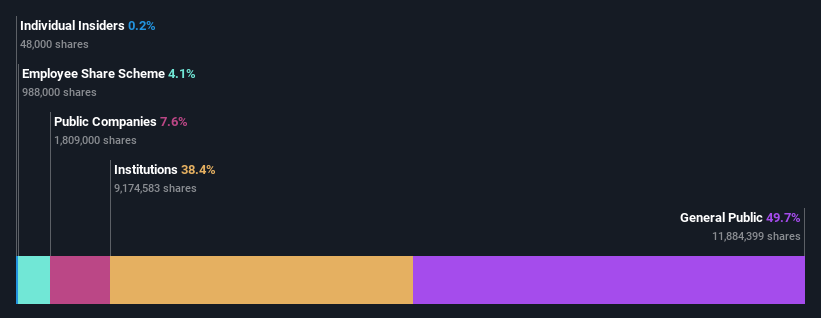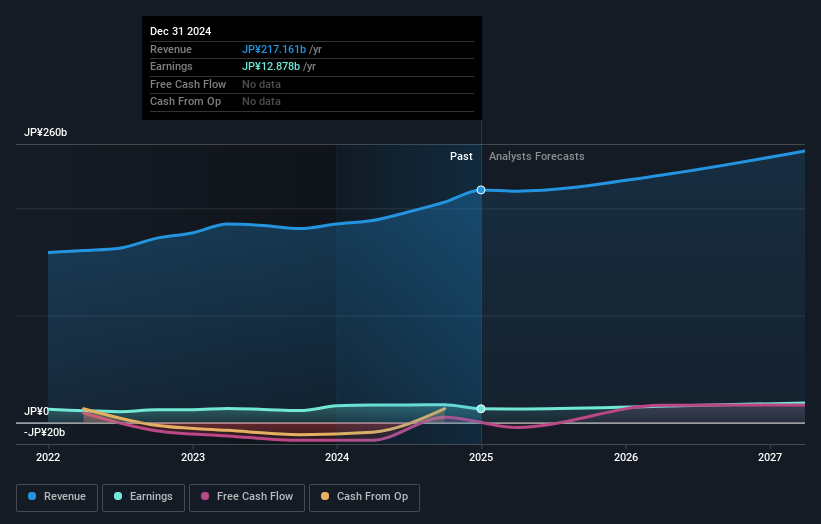Institutions along with individual investors who hold considerable shares inDAIHEN Corporation (TSE:6622) come under pressure; lose 21% of holdings value
Key Insights
- Significant control over DAIHEN by individual investors implies that the general public has more power to influence management and governance-related decisions
- The top 25 shareholders own 48% of the company
- 38% of DAIHEN is held by Institutions
To get a sense of who is truly in control of DAIHEN Corporation (TSE:6622), it is important to understand the ownership structure of the business. The group holding the most number of shares in the company, around 50% to be precise, is individual investors. In other words, the group stands to gain the most (or lose the most) from their investment into the company.
While the holdings of individual investors took a hit after last week’s 21% price drop, institutions with their 38% holdings also suffered.
In the chart below, we zoom in on the different ownership groups of DAIHEN.
Check out our latest analysis for DAIHEN

What Does The Institutional Ownership Tell Us About DAIHEN?
Institutional investors commonly compare their own returns to the returns of a commonly followed index. So they generally do consider buying larger companies that are included in the relevant benchmark index.
We can see that DAIHEN does have institutional investors; and they hold a good portion of the company's stock. This suggests some credibility amongst professional investors. But we can't rely on that fact alone since institutions make bad investments sometimes, just like everyone does. When multiple institutions own a stock, there's always a risk that they are in a 'crowded trade'. When such a trade goes wrong, multiple parties may compete to sell stock fast. This risk is higher in a company without a history of growth. You can see DAIHEN's historic earnings and revenue below, but keep in mind there's always more to the story.

DAIHEN is not owned by hedge funds. Sumitomo Mitsui Trust Asset Management Co., Ltd. is currently the largest shareholder, with 6.2% of shares outstanding. The Kansai Electric Power Company, Incorporated is the second largest shareholder owning 6.1% of common stock, and Nomura Asset Management Co., Ltd. holds about 5.9% of the company stock.
A deeper look at our ownership data shows that the top 25 shareholders collectively hold less than half of the register, suggesting a large group of small holders where no single shareholder has a majority.
Researching institutional ownership is a good way to gauge and filter a stock's expected performance. The same can be achieved by studying analyst sentiments. Quite a few analysts cover the stock, so you could look into forecast growth quite easily.
Insider Ownership Of DAIHEN
The definition of an insider can differ slightly between different countries, but members of the board of directors always count. Management ultimately answers to the board. However, it is not uncommon for managers to be executive board members, especially if they are a founder or the CEO.
I generally consider insider ownership to be a good thing. However, on some occasions it makes it more difficult for other shareholders to hold the board accountable for decisions.
Our information suggests that DAIHEN Corporation insiders own under 1% of the company. It has a market capitalization of just JP¥120b, and the board has only JP¥240m worth of shares in their own names. Many investors in smaller companies prefer to see the board more heavily invested. You can click here to see if those insiders have been buying or selling.
General Public Ownership
With a 50% ownership, the general public, mostly comprising of individual investors, have some degree of sway over DAIHEN. While this group can't necessarily call the shots, it can certainly have a real influence on how the company is run.
Public Company Ownership
Public companies currently own 7.6% of DAIHEN stock. We can't be certain but it is quite possible this is a strategic stake. The businesses may be similar, or work together.
Next Steps:
It's always worth thinking about the different groups who own shares in a company. But to understand DAIHEN better, we need to consider many other factors. To that end, you should be aware of the 1 warning sign we've spotted with DAIHEN .
Ultimately the future is most important. You can access this free report on analyst forecasts for the company .
NB: Figures in this article are calculated using data from the last twelve months, which refer to the 12-month period ending on the last date of the month the financial statement is dated. This may not be consistent with full year annual report figures.
Have feedback on this article? Concerned about the content? Get in touch with us directly. Alternatively, email editorial-team (at) simplywallst.com.
This article by Simply Wall St is general in nature. We provide commentary based on historical data and analyst forecasts only using an unbiased methodology and our articles are not intended to be financial advice. It does not constitute a recommendation to buy or sell any stock, and does not take account of your objectives, or your financial situation. We aim to bring you long-term focused analysis driven by fundamental data. Note that our analysis may not factor in the latest price-sensitive company announcements or qualitative material. Simply Wall St has no position in any stocks mentioned.
 Wall Street Journal
Wall Street Journal